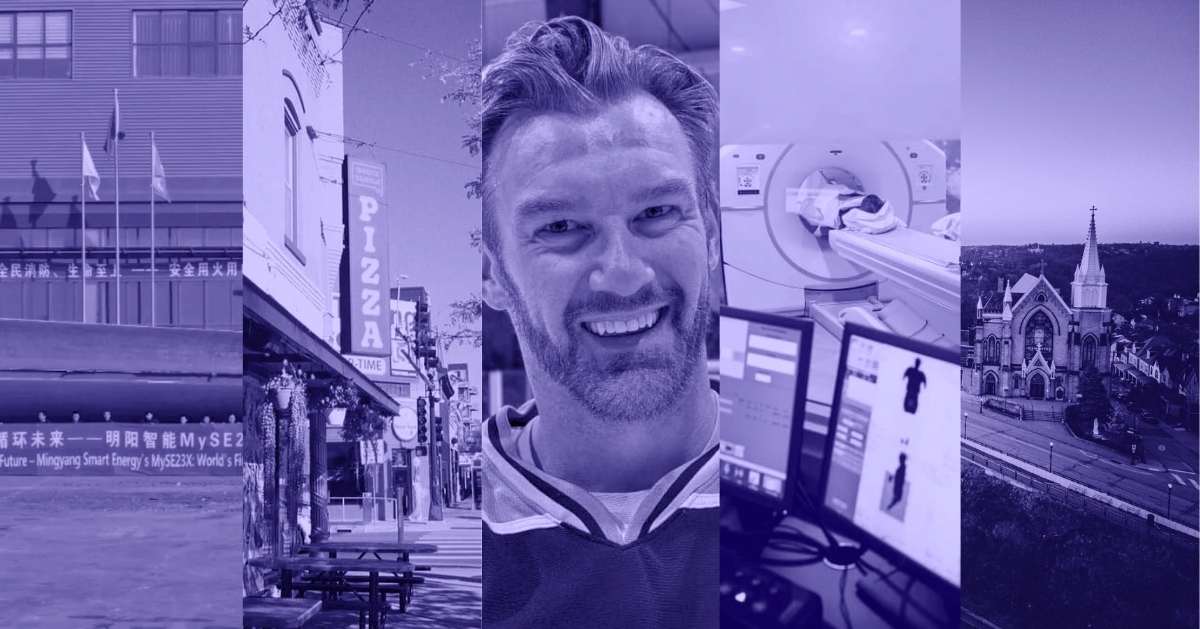Every day the Good Good Good team collects the best good news in the world and shares it with our community. Here are the highlights for this week!
If you want to get good news in your inbox every day, join the Goodnewsletter — the free daily newsletter designed to leave you feeling hopeful.
The Best Positive News We’re Celebrating This Week —
Ireland expanded its free public transit program for children 8 years old and under
Transport For Ireland, or TFI, services have been offered to kids five years old and younger — and now, Ireland is expanding that free offering to cover ages five through eight, too.
The new Child Leap Card will make 263,000 children between the ages of five and eight eligible for free travel services in the country, which include buses and rail lines.
The initiative is part of a larger government commitment to making public transit more affordable and accessible for families.
Why is this good news? We all need to visit the doctor, get groceries, and more, and people deserve equitable access to public transit to do that. For families, the cost of using public transportation can add up, putting financial strain on people looking to navigate their communities. With this initiative, Ireland removes that barrier for thousands of families.
→ Read more
This LEGO contest tasked contestants with building their dream houses. The proceeds will go to real homes for low-income families
After a landlord in Wisconsin passed away, he donated all of his rental properties to homeless people in need of housing
On July 31, the Wisconsin-based housing nonprofit Pillars received its largest property donation ever. It came in the name of Richard “Dick” Reetz, a landlord of over 50 years who died in June at the age of 97.
He donated his entire rental estate, including 20 units across 10 properties, which increased the organization’s property portfolio by 26%.
Pillars is an organization that works to relieve bottlenecks in the housing crisis by keeping people out of shelters and in stable housing. Right now, the organization manages a number of affordable housing properties near Appleton — where Reetz was a lifelong resident — and operates two crisis housing centers that serve approximately 140 people at any given time. Now, it will serve even more.
→ Read more
Boston is transforming abandoned office space into affordable homes for 1,000+ residents
In 2023, Boston launched a city-first Office-to-Residential Conversion Program. The initiative offers a tax deduction of up to 75% for up to 29 years for downtown office buildings that convert to residential use.
Fast forward about two years, and the first residents to benefit from the program are now moving into their new homes.
The city has received 15 applications to create 762 housing units across 20 buildings and convert over 600,000 square feet of office space. Once they’re complete, the projects will bring an estimated 1,500 new people living downtown by the end of 2026. With project proposals due in December, it could be even more.
Why is this good news? People deserve housing that’s affordable in their community. Instead of office spaces sitting vacant or underutilized, the program helps convert them into something that serves the city’s residents — especially those who can’t afford skyrocketing rent prices.
Can smartphones actually enable teens to get outside? How tech is empowering youth to ‘touch grass’
Solar power has overtaken gas to become Hungary’s second-largest energy source
Just a decade ago in Hungary, solar power generated a mere 0.2% of the country’s electricity — it was essentially non-existent.
In 2024, after years of skyrocketing growth, it officially overtook gas to become the country’s second-largest source of electricity, behind nuclear.
Over the same time period, coal fell to just 6% of the country’s energy generation, which helped lead to the country’s carbon emissions dropping by 45% since 1990.
Eliminating income requirements, New Mexico will officially become the first U.S. state to guarantee free, universal child care
New Mexico’s governor just announced that the state is eliminating income eligibility requirements of its current child care assistance program — making it available to everyone.
The current program waives copayments for families with incomes at or below 400% of the federal poverty line, allowing them to pay little-to-no costs. Starting in November, that will apply to all families, regardless of income, making it the first universal free child care program in the United States.
The state estimates it will save families an average of $12,000 per child.
Even better: The state is already anticipating the rise in demand that will follow, and is investing millions of dollars to construct, expand, and renovate child care facilities to meet it. It’s also increasing reimbursement rates for facilities, and committing to pay entry-level staff a minimum of $18 per hour.
→ Read more
This former Denny’s was transformed into a vibrant childcare center for LA’s homeless families
→ Read more
Scientists throughout history have saved billions of lives with their inventions
After first learning about the COVID-19 outbreak in January 2020, researcher and career vaccine developer Sarah Gilbert started working on a vaccine. By the end of the year, it was approved and went on to save an estimated 6.3 million lives in just the next year.
While it can be difficult to estimate the exact number of lives that were not lost to a disease or health condition, there is no doubt that these inventions — and the team of scientists and helpers behind them — have saved so many, and prevented unquestionable suffering, overwhelmed health systems, and more.
Beyond vaccines, even inventions like synthetic fertilizer have helped prevent billions of people from dying from hunger, helping food production keep up with the population.
New South Wales is creating one of its largest national parks to protect thousands of koalas and ban logging
In the state of New South Wales, Australia, the current government confirmed its creation of a great koala national park, adding 176,000 hectares of forest to existing reserves and creating one of the state’s largest national parks.
Not only will the park protect more than 12,000 koalas, it will also put an immediate moratorium on logging within its boundaries.
The decision comes after months of pressure from local environment advocates who had been frustrated with ongoing logging and long-time government promises to establish the national park.
Why is this good news? The protected area includes old-growth forests that are critical biodiversity hotspots for the entire world. They’re home to 100 threatened species, including koalas and greater gliders. When critical ecosystems thrive thanks to protection and conservation, it helps the planet, wildlife, and humans, too.
→ Read more
This futuristic, flood-resistant tiny home can be ‘dropped’ anywhere housing is needed
→ Read more
With some of the safest roads in the world, the UK’s death rate per mile driven has declined 22-fold since 1950
In the 1920s and ‘30s in the United Kingdom, between 5,000 and 7,000 people died in road accidents each year. Today, that’s dropped to around 1,700 people dying in road incidents every year — about a quarter of what it used to be, despite there being 16 times more vehicles on the roads and 33 times as many miles driven.
That’s a 22-fold decrease in the death rate per mile driven. If the death per mile driven were as high as in 1950, the country would see 37,000 road deaths per year instead of 1,700.
Speed limits, the introduction of highways, well-designed roundabouts, cracking down on drunk driving, and other policies had the biggest impact in helping the country reach this point.
→ Read more
For the first time, scientists traced heat waves back to individual fossil fuel companies
In new research that pushes the boundaries of extreme weather event research in multiple ways, scientists have quantified causal links between worsening heat waves and pollution from individual fossil fuel and cement companies.
Looking at 213 heat waves from around the world between 2000 to 2023, it found that they became more frequent, likely, and severe, in large part due to burning fossil fuels. Between the first and second decades, climate change made heatwaves jump from being 20 times more likely to 200 times.
The researchers said as many as a quarter of the extreme heat events would have been “virtually impossible” without the pollution from any of the 14 largest fossil fuel and cement producers, including ExxonMobil and Chevron.
Why is this good news? While individual studies have explored links between climate change and extreme weather events, this latest study connects them in a new, important way. The conclusions could help those looking to make oil and gas companies pay for climate change-related damages, which has historically been difficult to prove.
AI technologies are changing the way we address wildfires: ‘You can replace a drone. You can’t replace a person’
→ Read more
A Michigan man is walking nearly 1,500 miles to Miami to raise funds and awareness about mental health
On a nearly 1,500-mile journey from West Michigan to South Florida, Lee Johns is carrying a 60-pound pack with essential supplies and a simple message: “Nobody should have to face their mental health battles alone.”
Johns himself has faced mental health struggles, as have several of his family members, and was frustrated that “it just never really gets addressed.” So he wanted to do something.
In addition to sparking conversations and raising awareness for mental health along the way — both in-person and on social media — Johns is raising money for the National Alliance on Mental Illness, which provides education, support, advocacy, and resources for individuals, families, and communities.
→ Read more
More good news of the week —
Despite a lack of federal support, scientists in the U.S. are continuing to develop critical global climate reports. The 46 scientists are joining an international effort through the IPCC, which announced a total of 664 authors for the current climate assessment cycle. Notably, for the first time, there are more authors, 51%, from developing and emerging-economy countries than from developed countries.
A writer created a first-of-its-kind cookbook printed in disappearing ink to highlight the impacts of dementia. The authors hope it can “reshape public perceptions of the condition,” and book launch events will aim to “engage communities, policymakers and care providers in conversations around dementia care and the importance of preserving lived experience.”
Thanks to a conservation push, Mexico’s jaguar population has increased by 30% in the last 14 years. In 2024, there were 5,326 jaguars in Mexico, a 30% increase compared with 2010, and conservationists hope that in 15 years species will no longer be at risk of extinction.
Members of the music community are rallying to support a Utah violinist arrested by ICE. Musicians have been staging ongoing performances in protest at the Utah State Capitol and sharing their anger and concern on social media regarding ICE’s arrest of Donggin Shin, who goes by John, and a GoFundMe has raised over $70,000 to help cover the musician’s legal fees.
Chemists introduced a new plastic upcycling process that could make mixed-plastics recycling a reality. The process harnesses a new, inexpensive nickel-based catalyst that selectively breaks down polyolefin plastics consisting of polyethylenes and polypropylenes—the single-use kind that dominates nearly two-thirds of global plastic consumption.
James Patterson is giving up to $50,000 to new, emerging authors to help them finish their books. After years of giving millions of dollars to literacy programs, bookstore employees, and librarians, Patterson announced the first 12 recipients of grants from his “Go Finish Your Book” campaign.
A German biotech startup just launched the world’s first vegan pregnancy test, developed entirely without animal-derived antibodies. The “Hey Mela” test is over 99% reliable, which matches the accuracy of conventional pregnancy tests while eliminating animal involvement entirely, reaching people looking for a cruelty-free, sustainable alternative.
Argentina’s last captive elephant was relocated to an elephant sanctuary in Brazil. Kenya’s release was made possible by a 2016 Argentine law that mandated the closure of the nation’s zoos, their transformation into ecoparks, and the relocation of exotic animals to sanctuaries or rescue centers.
A nonprofit in Texas is paying young people to receive civic engagement training. A youth advocacy group created the new Leaders of Tomorrow program for young people between the ages of 16 and 24 who are paid $2,500 stipends to support their advocacy efforts. Their goal is to “elevate youth voices, specifically around policy work.”
A soldier plans to give away more than $50,000 donated for his cancer treatment to other patients in need. After Sgt. 1st Class David Hong’s insurance provider changed its position and paid for his cancer treatment, Hong decided to give away all the money donors gave him to help other veterans and soldiers with cancer.
Scientists can now use a glue gun-style tool to repair broken bones. The new tool can create customized bone grafts in a matter of minutes, which could help reduce operative times and improve the efficiency of procedures.
A DC literacy center partnered with a nonprofit to help people who struggle to read navigate the health care system. Doctor’s reports or prescription instructions can already be difficult to understand, and for those who struggle to read — it’s even more challenging, which can further complicate health outcomes.
Melinda Gates announced a $100 million investment in accelerating women’s health research. The investment will focus on areas of women’s health with the highest rates of mortality, including autoimmune disease, mental health, and cardiovascular health, looking at underresearched areas like chronic disease and menopause.
Brazil has seen a 65% drop in the area of the Amazon rainforest burned by fire, thanks to more careful communities and heavy rain. It’s the lowest recorded amount of area burns, and the data also shows that across Brazil, both in the Amazon basin and beyond it, 54% fewer acres of landscape have been burned by fires.
In a landmark case, a judge in Hong Kong ruled in favor of lesbian couples seeking parental recognition. The couple’s son was born through reciprocal in vitro fertilization, and the ruling is a step forward for the LGBTQ movement in a city that does not endorse same-sex marriages but is working toward a framework to recognize same-sex partnerships.
As part of a long-term restoration project, 1,600 new seedlings were planted to boost a monarch butterfly pollinator habitat. As the monarch “super generation” is already beginning to migrate south to Mexico, many will make their way through Michigan’s Peninsula Point, which is the state’s most well-known migratory monarch waystation, with clusters of the butterflies roosting on cedar trees.
At a new “Habitat for Humanity factory,” high school students are building tiny homes for their neighbors in need. The Boulder MOD program also teaches young professionals valuable skills with a real-world impact, and at least one student has already been able to connect with a solar energy company, which will be his future employer, thanks to his work in the factory.
Scientists created solar cells that generate electricity from indoor light with record efficiency. The breakthrough helps capture artificial light more effectively, and could reduce reliance on disposable batteries and open the door to powering everyday devices in homes and offices.
An Iowa company puts discarded wind turbine blades in concrete blocks — they’ve already been used in construction. It’s another solution that could help alleviate the issue of recycling retired wind turbine blades, which one study estimated would be more than 2 million tons by 2050 in the U.S. alone.
Illinois became the first Midwest state to require public university health centers to offer medication abortion and contraception. California, Massachusetts, and New York already have the same requirement in place, which will remove barriers for students to access essential reproductive healthcare.



